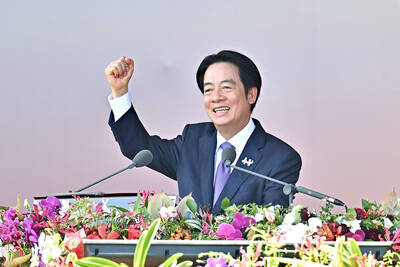At 96 years old, Lien Chin-ting (連金廷) has become the nation’s oldest licensed caregiver.
“I am old, so I know better how to care for old people,” he said on Friday, as he demonstrated how to care for a bedridden patient.
At the encouragement of his daughter, Lien said he often attends activities at an elderly-care center in Taichung.

Photo: Tsai Shu-yuan, Taipei Times
However, it was not the classes that sparked his interest, but rather the work of caregiving itself, he said.
In January, he began a 97-hour course that includes 52 hours of coursework, eight hours of practical work and 30 hours of clinical practice.
After completing his courses and a written examination, he received his caregiver license last month and now volunteers at the same center that inspired his journey.
As he himself is of an advanced age, Lien said he would never charge for his services.
Lien retired at 70, but leads an active life, going on hikes, serving as a certified Taoist cleric, and taking classes in Japanese and other subjects.
“My dad has never stopped learning and exercising,” his daughter said. “He really has no issues physically.”
This new chapter is not too big of a change, as Lien cared for his wife before she died about eight years ago and often helps with his grandchildren.
He is now studying other aspects of professional caregiving, such as nutrition, and has obtained cardiopulmonary resuscitation certification, he added.
“Now I can care for others as well as myself,” he said.

The Ministry of the Interior (MOI) is to tighten rules for candidates running for public office, requiring them to declare that they do not hold a Chinese household registration or passport, and that they possess no other foreign citizenship. The requirement was set out in a draft amendment to the Enforcement Rules of the Public Officials Election and Recall Act (公職人員選舉罷免法 ) released by the ministry on Thursday. Under the proposal, candidates would need to make the declaration when submitting their registration forms, which would be published in the official election bulletin. The move follows the removal of several elected officials who were

FOUR DESIGNATED AREAS: Notices were issued for live-fire exercises in waters south and northwest of Penghu, northeast of Keelung and west of Kaohsiung, they said The military is planning three major annual exercises across the army, navy and air force this month, with the navy’s “Hai Chiang” (海強, “Sea Strong”) drills running from today through Thursday, the Ministry of National Defense said yesterday. The Hai Chiang exercise, which is to take place in waters surrounding Taiwan, would feature P-3C Orion maritime patrol aircraft and S-70C anti-submarine helicopters, the ministry said, adding that the drills aim to bolster the nation’s offshore defensive capabilities. China has intensified military and psychological pressure against Taiwan, repeatedly sending warplanes and vessels into areas near the nation’s air defense identification zone and across

SENATE RECOMMENDATION: The National Defense Authorization Act encourages the US secretary of defense to invite Taiwan’s navy to participate in the exercises in Hawaii The US Senate on Thursday last week passed the National Defense Authorization Act (NDAA) for Fiscal Year 2026, which strongly encourages the US secretary of defense to invite Taiwan’s naval forces to participate in the Rim of the Pacific (RIMPAC) exercise, as well as allocating military aid of US$1 billion for Taiwan. The bill, which authorizes appropriations for the military activities of the US Department of Defense, military construction and other purposes, passed with 77 votes in support and 20 against. While the NDAA authorizes about US$925 billion of defense spending, the Central News Agency yesterday reported that an aide of US

NATIONAL DAY: The ‘Taiwan Dome’ would form the centerpiece of new efforts to bolster air defense and be modeled after Israel’s ‘Iron Dome,’ sources said President William Lai (賴清德) yesterday pledged to strengthen the nation’s air defense capabilities and build a “T-Dome” system to create a safety net against growing military threats from China. “We will accelerate our building of the T-Dome, establish a rigorous air defense system in Taiwan with multi-layered defense, high-level detection and effective interception, and weave a safety net for Taiwan to protect the lives and property of citizens,” he said in his National Day address. In his keynote address marking the Republic of China’s (ROC) 114th anniversary, Lai said the lessons of World War II have taught nations worldwide “to ensure that